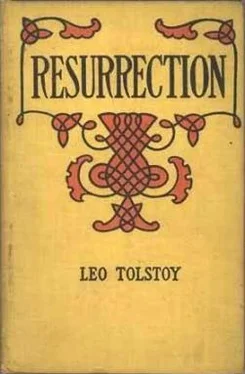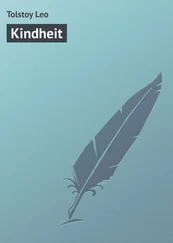Leo Tolstoy - Resurrection
Здесь есть возможность читать онлайн «Leo Tolstoy - Resurrection» весь текст электронной книги совершенно бесплатно (целиком полную версию без сокращений). В некоторых случаях можно слушать аудио, скачать через торрент в формате fb2 и присутствует краткое содержание. Жанр: Русская классическая проза, на английском языке. Описание произведения, (предисловие) а так же отзывы посетителей доступны на портале библиотеки ЛибКат.
- Название:Resurrection
- Автор:
- Жанр:
- Год:неизвестен
- ISBN:нет данных
- Рейтинг книги:4 / 5. Голосов: 1
-
Избранное:Добавить в избранное
- Отзывы:
-
Ваша оценка:
- 80
- 1
- 2
- 3
- 4
- 5
Resurrection: краткое содержание, описание и аннотация
Предлагаем к чтению аннотацию, описание, краткое содержание или предисловие (зависит от того, что написал сам автор книги «Resurrection»). Если вы не нашли необходимую информацию о книге — напишите в комментариях, мы постараемся отыскать её.
Resurrection — читать онлайн бесплатно полную книгу (весь текст) целиком
Ниже представлен текст книги, разбитый по страницам. Система сохранения места последней прочитанной страницы, позволяет с удобством читать онлайн бесплатно книгу «Resurrection», без необходимости каждый раз заново искать на чём Вы остановились. Поставьте закладку, и сможете в любой момент перейти на страницу, на которой закончили чтение.
Интервал:
Закладка:
“It seems the officer is ashamed of himself,” she shouted, so as to be heard above the rattle of the wheels. “Bousovkin’s manacles have been removed, and he is carrying his little girl himself. Katusha and Simonson are with him, and Vera, too. She has taken my place.”
Kryltzoff said something that could not be heard because of the noise, and frowning in the effort to repress his cough shook his head. Then Nekhludoff stooped towards him, so as to hear, and Kryltzoff, freeing his mouth of the handkerchief, whispered:
“Much better now. Only not to catch cold.”
Nekhludoff nodded in acquiescence, and again exchanged a glance with Mary Pavlovna.
“How about the problem of the three bodies?” whispered Kryltzoff, smiling with great difficulty. “The solution is difficult.”
Nekhludoff did not understand, but Mary Pavlovna explained that he meant the well-known mathematical problem which defined the position of the sun, moon and earth, which Kryltzoff compared to the relations between Nekhludoff, Katusha and Simonson. Kryltzoff nodded, to show that Mary Pavlovna had explained his joke correctly.
“The decision does not lie with me,” Nekhludoff said.
“Did you get my note? Will you do it?” Mary Pavlovna asked.
“Certainly,” answered Nekhludoff; and noticing a look of displeasure on Kryltzoff’s face, he returned to his conveyance, and holding with both hands to the sides of the cart, got in, which jolted with him over the ruts of the rough road. He passed the gang, which, with its grey cloaks and sheepskin coats, chains and manacles, stretched over three-quarters of a mile of the road. On the opposite side of the road Nekhludoff noticed Katusha’s blue shawl, Vera Doukhova’s black coat, and Simonson’s crochet cap, white worsted stockings, with bands, like those of sandals, tied round him. Simonson was walking with the woman and carrying on a heated discussion.
When they saw Nekhludoff they bowed to him, and Simonson raised his hat in a solemn manner. Nekhludoff, having nothing to say, did not stop, and was soon ahead of the carts. Having got again on to a smoother part of the road, they drove still more quickly, but they had continually to turn aside to let pass long rows of carts that were moving along the road in both directions.
The road, which was cut up by deep ruts, lay through a thick pine forest, mingled with birch trees and larches, bright with yellow leaves they had not yet shed. By the time Nekhludoff had passed about half the gang he reached the end of the forest. Fields now lay stretched along both sides of the road, and the crosses and cupolas of a monastery appeared in the distance. The clouds had dispersed, and it had cleared up completely; the leaves, the frozen puddles and the gilt crosses and cupolas of the monastery glittered brightly in the sun that had risen above the forest. A little to the right mountains began to gleam white in the blue-grey distance, and the trap entered a large village. The village street was full of people, both Russians and other nationalities, wearing peculiar caps and cloaks. Tipsy men and women crowded and chattered round booths, traktirs, public houses and carts. The vicinity of a town was noticeable. Giving a pull and a lash of the whip to the horse on his right, the driver sat down sideways on the right edge of the seat, so that the reins hung over that side, and with evident desire of showing off, he drove quickly down to the river, which had to be crossed by a ferry. The raft was coming towards them, and had reached the middle of the river. About twenty carts were waiting to cross. Nekhludoff had not long to wait. The raft, which had been pulled far up the stream, quickly approached the landing, carried by the swift waters. The tall, silent, broad-shouldered, muscular ferryman, dressed in sheepskins, threw the ropes and moored the raft with practised hand, landed the carts that were on it, and put those that were waiting on the bank on board. The whole raft was filled with vehicles and horses shuffling at the sight of the water. The broad, swift river splashed against the sides of the ferryboats, tightening their moorings.
When the raft was full, and Nekhludoff’s cart, with the horses taken out of it, stood closely surrounded by other carts on the side of the raft, the ferryman barred the entrance, and, paying no heed to the prayers of those who had not found room in the raft, unfastened the ropes and set off.
All was quiet on the raft; one could hear nothing but the tramp of the ferryman’s boots and the horses changing from foot to foot.
XXI
“Just a worthless tramp.”
Nekhludoff stood on the edge of the raft looking at the broad river. Two pictures kept rising up in his mind. One, that of Kryltzoff, unprepared for death and dying, made a heavy, sorrowful impression on him. The other, that of Katusha, full of energy, having gained the love of such a man as Simonson, and found a true and solid path towards righteousness, should have been pleasant, yet it also created a heavy impression on Nekhludoff’s mind, and he could not conquer this impression.
The vibrating sounds of a big brass bell reached them from the town. Nekhludoff’s driver, who stood by his side, and the other men on the raft raised their caps and crossed themselves, all except a short, dishevelled old man, who stood close to the railway and whom Nekhludoff had not noticed before. He did not cross himself, but raised his head and looked at Nekhludoff. This old man wore a patched coat, cloth trousers and worn and patched shoes. He had a small wallet on his back, and a high fur cap with the fur much rubbed on his head.
“Why don’t you pray, old chap?” asked Nekhludoff’s driver as he replaced and straightened his cap. “Are you unbaptized?”
“Who’s one to pray to?” asked the old man quickly, in a determinately aggressive tone.
“To whom? To God, of course,” said the driver sarcastically.
“And you just show me where he is, that god.” There was something so serious and firm in the expression of the old man, that the driver felt that he had to do with a strong-minded man, and was a bit abashed. And trying not to show this, not to be silenced, and not to be put to shame before the crowd that was observing them, he answered quickly.
“Where? In heaven, of course.”
“And have you been up there?”
“Whether I’ve been or not, every one knows that you must pray to God.”
“No one has ever seen God at any time. The only begotten Son who is in the bosom of the Father he hath declared him,” said the old man in the same rapid manner, and with a severe frown on his brow.
“It’s clear you are not a Christian, but a hole worshipper. You pray to a hole,” said the driver, shoving the handle of his whip into his girdle, pulling straight the harness on one of the horses.
Some one laughed.
“What is your faith, Dad?” asked a middle-aged man, who stood by his cart on the same side of the raft.
“I have no kind of faith, because I believe no one—no one but myself,” said the old man as quickly and decidedly as before.
“How can you believe yourself?” Nekhludoff asked, entering into a conversation with him. “You might make a mistake.”
“Never in your life,” the old man said decidedly, with a toss of his head.
“Then why are there different faiths?” Nekhludoff asked.
“It’s just because men believe others and do not believe themselves that there are different faiths. I also believed others, and lost myself as in a swamp,—lost myself so that I had no hope of finding my way out. Old believers and new believers and Judaisers and Khlysty and Popovitzy, and Bespopovitzy and Avstriaks and Molokans and Skoptzy—every faith praises itself only, and so they all creep about like blind puppies. There are many faiths, but the spirit is one—in me and in you and in him. So that if every one believes himself all will be united. Every one be himself, and all will be as one.”
Читать дальшеИнтервал:
Закладка:
Похожие книги на «Resurrection»
Представляем Вашему вниманию похожие книги на «Resurrection» списком для выбора. Мы отобрали схожую по названию и смыслу литературу в надежде предоставить читателям больше вариантов отыскать новые, интересные, ещё непрочитанные произведения.
Обсуждение, отзывы о книге «Resurrection» и просто собственные мнения читателей. Оставьте ваши комментарии, напишите, что Вы думаете о произведении, его смысле или главных героях. Укажите что конкретно понравилось, а что нет, и почему Вы так считаете.












